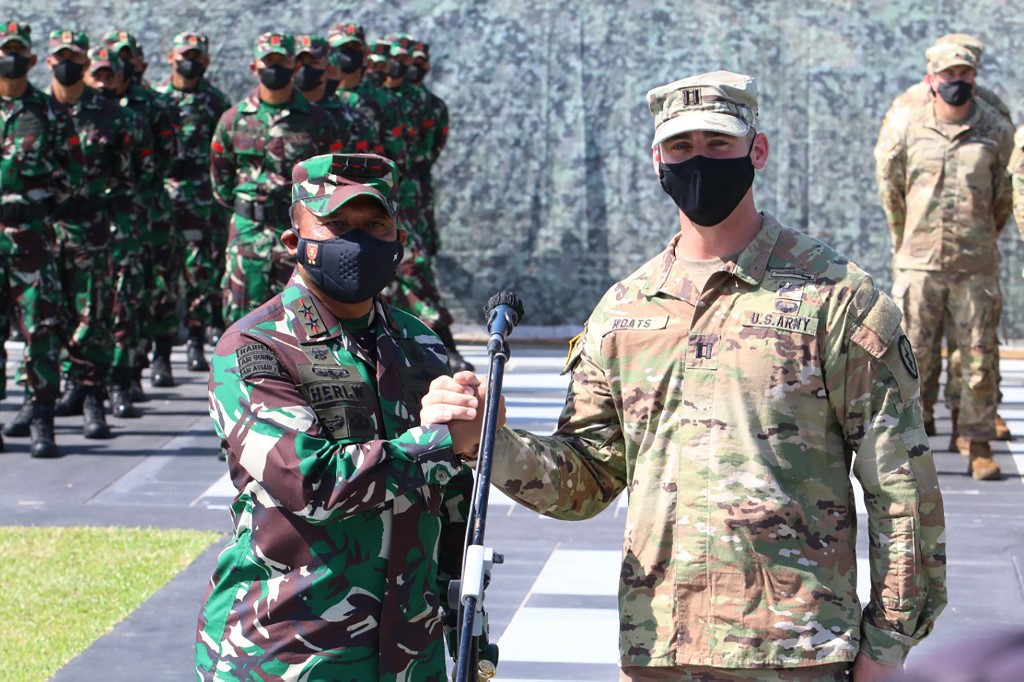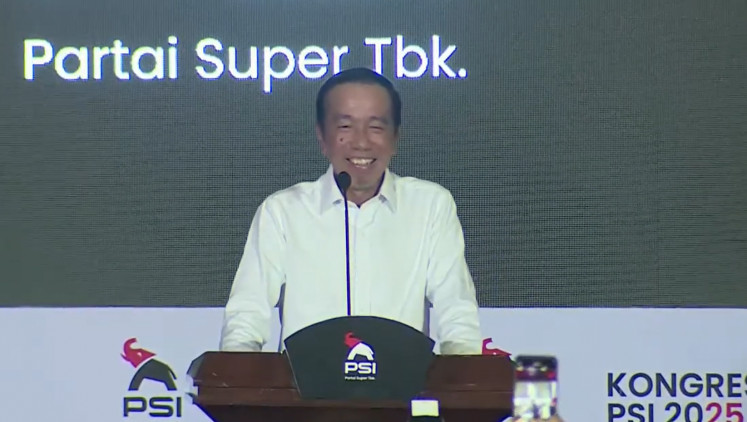Popular Reads
Top Results
Can't find what you're looking for?
View all search resultsPopular Reads
Top Results
Can't find what you're looking for?
View all search resultsEnhancing TNI's professionalism via joint military exercises
It is hoped that the 15th edition of the Indonesia-US joint military exercise, dubbed Garuda Shield, will provide a way forward for modernizing Indonesia's military arsenal and weapons systems, aside from deepening bilateral trust through professional and cultural exchange.
Change text size
Gift Premium Articles
to Anyone
T
he timing couldn’t be any better for soldiers of the Indonesian Army (TNI AD) to take part in a joint military exercise with their United States counterparts, now underway until Aug. 14. Three days after the 15th Garuda Shield ends, the TNI AD soldiers will join the nation in commemorating the 76th anniversary of Indonesian independence.
The two-week joint military exercise is the biggest ever between the two countries, involving more than 2,100 Indonesian soldiers and around 1,500 US troops. Upon learning that the exercise would be conducted at the height of the COVID-19 pandemic in Indonesia, both sides agreed to follow the strict health protocols as set by the World Health Organization.
Sponsored by the US Army Pacific (USARPAC), this joint exercise held in three TNI AD training zones in Baturaja in South Sumatra, Amborawang in East Kalimantan and in Makalisung in South Sulawesi is intended to enhance their combined capabilities in interoperability through training and cultural exchange.
The training component has several focuses, including staff exercises, field training exercise (FTX), live fire exercises, medical exercises and aviation exercises. The FTX specifically allows the two armies to practice combined, fundamental combat fighting skills to enhance interoperability and combined operational capacity.
Actually, the Indonesian Military (TNI) has long taken part in numerous joint military exercises with its foreign partners, such as Singapore, Malaysia, the Philippines and Thailand in Southeast Asia, and Japan, Australia and South Korea in the Pacific, with China in the wider region. Presidential Regulation No. 66/2019 has strengthened the legal basis for the TNI to participate in joint military training exercises with an aim to enhance the professionalism of the nation’s soldiers.
Indonesia’s bebas aktif (free and active) foreign policy has enabled the TNI greater opportunities for holding joint drills with many countries under mutual and reciprocal cooperation.
Prior to the 15th Garuda Shield, the Indonesian Navy participated in a joint exercise in 2019 with the US Marines at the Bhumi Marines Gedangan base in Sidoarjo, East Java. This training program focused on expert exchange, neo-combatant evacuation operation and the Reducing Risks, Protecting People (R2P2) decision-making process. About 40 personnel took part in the program, including 28 soldiers from the Indonesian Marine Corps, three US Marines personnel and four Indonesian Foreign Ministry officials, as well as Search and Rescue (SAR) personnel.
Over the past 32 years, the Indonesian and US navies have held regular joint exercises in either Indonesian or American jurisdictions.
One of the most prominent joint drills involved Kopaska, Indonesia’s elite frogmen squad, and the US Navy SEALs. The program covered various levels of tactical and strategic operations, from real-world battle simulations to counter-piracy operations and from jungle warfare to freefalling and to water landings. The two elite naval forces have taken turns in hosting the joint drills at either the US’ Naval Base Guam and Anderson Air Force Base or Indonesia’s Surabaya and Banyuwangi naval bases in East Java.
The Indonesian Army’s Special Forces (Kopassus) is another elite force that has participated in regular joint exercises with its foreign counterparts. The latest training was held in 2016 and involved Kopassus and the Australian Special Operations Command (SOCOMD), known for its specialization in counterterrorism operations and field experience in conflict-torn Afghanistan.
This May, the Indonesian Naval Command Western Region held a joint exercise with the People's Liberation Army Navy (PLAN) of China in the Java Sea, with a focus on SAR exercises and tactical maneuvers. The drill involved the Indonesian Navy’s KRI Usman Harun-359 and KRI Halasan-630 warships, while China sent the Liuzhou-573 (FFGHM) frigate and the Suqian-504 (FSGHM) corvette, which obtained diplomatic clearance to cross the Indonesian Archipelagic Sea Lane (ASL) from north to south.
Joint exercises between TNI and its foreign counterparts are common and have proven to strengthen military and diplomatic ties, rather than sending a false message to certain countries. In fact, joint military exercises are part of Indonesia’s defense diplomacy and Good Neighbor Policy in preventing potential conflicts, misunderstandings or miscommunications that might harm peace and stability.
Garuda Shield 2021 looks special because it involves a large number of troops. Interaction during the military exercise is expected to benefit soldiers in terms of the upskilling they need in light of the more challenging threats that nations will face in the future.
In the global context, the US is among the most influential powers. As a non-aligned country, Indonesia cannot claim to be immune from any influence, including from the US.
The primary concern regarding the TNI amid the global competition for spheres of influence is how it can defend national unity, which should be translated as its capability to deter any level of threat from either domestic or external forces, and even the hybrid threats that cannot be classified as domestic or external.
Considering that Indonesia’s national defense strategy is based on promoting geopolitical stability and geostrategic firmness, engaging with the US and other major powers is therefore unavoidable.
This huge responsibility of the TNI should be supported with greater professionalism, which concerns not only battlefield tactics and skills but also military diplomacy and communication affairs, not to mention adequate military equipment and armament systems.
Hopes abound that the 15th Garuda Shield will deepen trust between Indonesia and the US and pave the way for the TNI to meet its need to modernize its weaponry and military systems. Like the US has stated, the joint exercise provided excellent opportunities for professional and cultural exchanges to strengthen the Indonesia-US partnership through shared learning and training.
While it seems mutual trust is no longer an issue, arms procurement apparently is.
***
The writer is Indonesian deputy defense minister.










